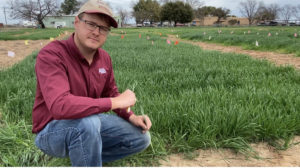Farming Sheep and Goats
The title of “Rancher” is highly regarded. It envokes admiration from most and carries connotations of savvy business skills and knowledge of all things animal. It is also rightfully associated with a long list of prideful adjectives; such as hard working, honest, and humble.
Sheep-men and -women in the Southwest and Western parts of the US generally carry this title.
But this is not true in other parts of the US and around the globe. In contrast, sheep “farmer” is the title that they generally feel is more fitting. More ball cap and less silver-belly, but still just as prideful about their 5 am – 9 pm daily efforts.
What is the difference between farmers and ranchers? In my assessment, ranchers tend livestock on native range and are naturalists. Farmers raise sheep or goats on farmland, improved pastures, or small acreage. Ranches are low input operations and survive on modest levels of productivity per animal. Farmers strive to maximize farmland outputs and maximize flock/herd productivity, often by supplying more inputs per animal, namely feed resources.
For a chuckle, watch Baxter Black’s video on the difference between the two: https://www.youtube.com/watch?v=PDrFDnqde54
It is not my intent to try and convince ranchers to become farmers but it my assessment that farming sheep and goats has been overlooked for cash crops. Internationally, sheep tend to be managed under farming condition, which allows them to raise more animals on less land.
In New Zealand and much of Australia, there seemed to be a large focus on forage crops for sheep. Ryegrass and clover were the dominant pasture forage. While this is an annual crop, these improved pasture varieties persisted for half a dozen years. They were also working on developing warm season annual crops to fill in the summer forage gap.
For instance, a farm that I visited in South Australia raised ~10,000 sheep on ~3,000 dryland acres and their average annual rainfall is comparable to the Concho Valley. Here we would have a stocking rate of 1/10 of theirs.
In the US, we tend to only focus on warm season perennial grasses as improved pasture. This tends to work well for beef cattle but not as well for sheep and goats. These warm season grasses are less palatable to small ruminants and they harbor the most problematic internal parasites.
Yes, it is a common practice to plant winter cereals as a cash crop and graze them in the fall and winter. But, by design, the genetics of these crops tends to focus on grain or hay production. Moreover, limited research has looked at planting cool season annuals into pasture.
I believe farmers (and maybe a few ranchers) need to investigate cool and warm season forage crops suited for sheep and goats that work in either farmland or fertile. pasture. While this has not been a major focus area of research, there are some resources that are available. Specifically, I encourage you to look at the forage variety trials that Texas A&M AgriLife conducts. http://varietytesting.tamu.edu/forages/

Dr. Reagan Noland manages forage variety plots located at AgriLife Center in San Angelo
This is definitely not an area of research that I am that familiar with and I encourage you to seek advice from a Texas A&M AgriLife forage agronomist in your area. However, I do know quite a few ranchers and farmers and know that most are opportunistic by nature. Sheep and goat prices are catching the eye of many outside of our industry, and even those that have small ruminants already are looking to expand. Acquiring traditional ranchland can be expensive and challenging to pencil out with livestock alone. But thinking outside of the traditional ways to run sheep and goats, farm ground or fortified pasture may make it possible to flip the discussion from “how many acres per sheep” to “how many sheep per acre”. Whether you call that farming or ranching is just a side note to a more important label; “profitable”.
To provide feedback on this article or request topics for future articles, contact me at reid.redden@ag.tamu.edu or 325-657-7324. For general questions about sheep and goats, contact your local Texas A&M AgriLife Extension Service county office. If they can’t answer your question, they have access to someone who can.